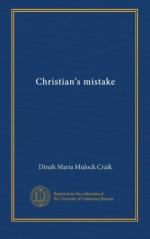Except sending marriage-cards, Sir Edwin has attempted no communication with Dr. and Mrs. Grey. Nor do they wish it. The difference between themselves and him, in wealth, rank, habits, tastes, would always make such association undesirable, even had they expected it renewed. But they did not. In their complete and contented life they had—until the marriage-cards came—almost forgotten the young man’s existence.
The aunts still live at Avonside Cottage, one cultivating flowers and the other society with equal assiduity. It is to be hoped both find an equal reward. As Aunt Henrietta grows to be no longer a middle-aged, but an elderly lady, less active, less clever, and more dependent upon other people’s kindness and especially upon that of the Lodge—which never fails her—she sometimes is thought to be growing a little gentler in her manner and ways, a little less suspicious, less ill-natured, less ready to see always the black and hard side of things instead of the sunny and sweet.
At any rate, there is never now the shadow of dispute between herself and her brother-in-law’s family! and she always talks a great deal “about about dear Mrs. Grey,” her elegant looks and manners (which are certainly patent to all), what a very good wife she has settled down into, and how much attached she is to the master. Even darkly hinting— in moments confidential—that “to my certain knowledge” Mrs. Grey had, as Christian Oakley, the opportunity of making an excellent marriage with a gentleman of family and position, who was devotedly in love with her, but whom she refused for the love of Dr. Arnold Grey. Which statement, when she came to hear it—which of course she did: every body hears every thing in Avonsbridge—only made Christian smile, half amused, half sad, to think how strangely truth can be twisted sometimes, even by well-meaning people, who are perfectly convinced in their own minds and consciences that they never tell a lie, and wouldn’t do such a thing for the world.
Nevertheless, Mrs. Grey sighed, and wondered if there was any absolute truth and absolute goodness to be found any where except in her own husband—her well-beloved and honored husband.
He is “turnin’ auld” now, like John Anderson in the song, and the great difference in age between himself and his wife is beginning to tell every year more plainly, so that she thinks sometimes, with a sharp pain and dread, of her own still remaining youth, fearing lest it may not be the will of God that they two should “totter down” the hill of life together. But she knows that all things—death and life included—are in His safe hands, and that sufficient unto the day is the evil thereof.
It has pleased Him to drop one other bitter drop into what would otherwise have been the entire sweetness of Christian’s overflowing cup. She has no children—that is, no children of her very own. Year by year, that hope of motherhood, in all its exquisite bliss, slipped away. At last it had quite to be let go, and its substitute accepted—as we most of us have, more or less, to accept the will of Heaven instead of our will, and go on our way resignedly, nay, cheerfully, knowing that, whether we see it or not, all is well.




